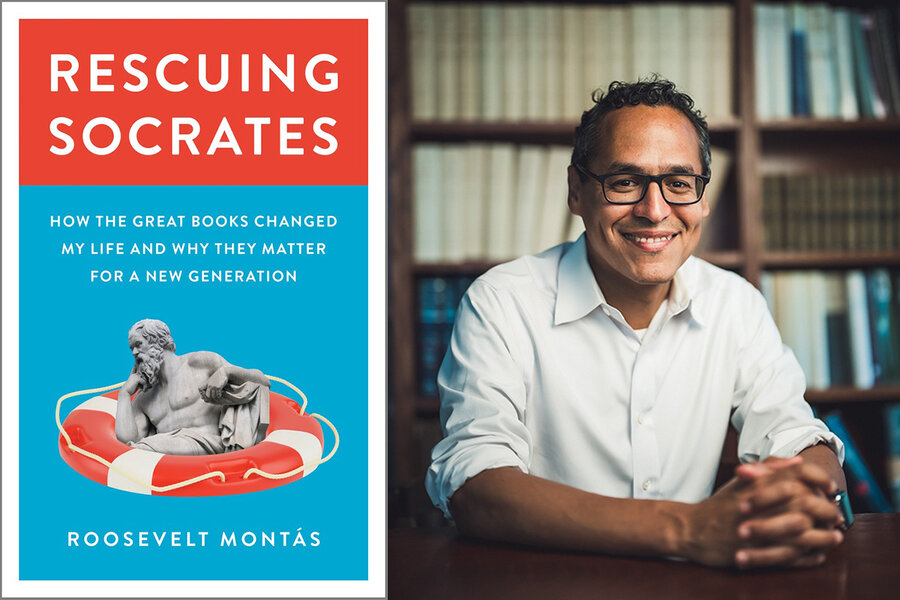
“Along with greenness and wonder of a country boy, I landed at JFK International Airport with a head full of lice and a belly full of tropical parasites. In many respects, I was an unlikely candidate for the Ivy League.” (p. 5)
Roosevelt Montas, a Dominican-born immigrant who lands in Queens, New York poor but eager to learn, finds a stack of books put out in front a brownstone for Garbage Day. Amazed that Americans would throw books away, Months picks up two books from the stack: one by Socrates, one by Shakespeare. Surprisingly, the book by Socrates unleashes a need in Montas to go to college. Columbia University accepts Mantas and he goes through the Great Books program when students read a classic book every week.
Although Mantas loved most of the Great Books–except for Aristotle–he focuses on the impact reading Saint Augustine, Socrates, Freud, and Gandi had on him. Behind the descriptions of these classic works, Mantas defends the idea that college students should read Great Books and not just study the subjects that will get them jobs when they graduate.
When I was teaching, I would slip some Great Books into my syllabi–Dicken’s Bleak House and Hard Times were favorites of my students–but most professors just stick to their subject matter and don’t attempt to expand the curriculum.
Roosevelt Montas, from 2008-2018, was director of Columbia’s Center for the Core Curriculum. He advocated for the Great Books he admires. Rescuing Socrates is a love letter to readers who love these wonderful books. GRADE: B+
TABLE OF CONTENTS:
Introduction: The Case — 1
Chapter 1. Turning My Attention Back to Myself: Saint Augustine — 21
Chapter 2. The Examined Life: Socrates, Plato, and a Little Bit of Aristotle — 66
Chapter 3. Making Peace with the Unconscious: Freud — 113
Chapter 4. Truth Is God: Gandhi — 162
Epilogue: Nuts and Bolts — 210
Acknowledgments — 227
Index — 233
I think that only in the Ivy League and a few other top colleges are students reading books like this. Universities became job training factories a generation ago-except for the rich. Such a loss.
Patti, you’re right about colleges and universities turning into degree mills. When I was teaching at my College, I was amazed they didn’t offer any History courses! No wonder Generation X Millennials and and Generation Z students know nothing about the Past!
That much devolution since even the ’80s…yikes.
Almost all the courses I took the last couple of years in college were History and English (including Drama).
Sound like this guy has an interesting life story. I’m with him on Aristotle, though – once was enough.
Jeff, sadly 40% of incoming students at my College needed to take Remedial England and Math. Our education system is broken! I’m not sure Drama was offered as an elective, either.
In my day, college had a number of noble purposes: parties, teaching one to drink, and teaching one how to think were prime among them. A knowledge of how to think and a decent liberal arts degree went a long way in preparing one for almost any kind of employment. Now the focus is centered on getting a good job (i.e., a career that will bring in lots of $$$) once you graduate; all other considerations seemed to have slipped by the wayside. I can’t help but feel that something important has been lost in this age of diploma mills.
Jerry, what’s been lost in this age of diploma mills is LEARNING! I taught on-line courses for a decade and saw student learning outcomes tumble. But, the College made more money from on-classes than on traditional classroom courses, so that’s what the Administration pushed. College Education is a business.
That was certainly true even at the public schools (particularly? probably not) I attended…U Hawaii, NOVA-Annandale and most emphatically George Mason Unversity, now the home of the Scalia School of Law.
Todd, I disagreed with Scalia’s legal theories, but I admire his love of opera and his educated quips.
I ran the I ran the photolab of a community college for over a decade at the beginning of the century. Both the administration and faculty insisted that students be treated like customers to be pandered to and handed out As like candy on Halloween night. I repeatedly saw the laziest, more arrogantly ignorant young adults expect the highest grades despite the most minimal of efforts and faculty terrified of even one negative comment on their teacher evaluations. I have no doubt the vast majority of them (and their parents) would be happy to pay a flat fee for the diploma and skip the pretense of education completely.
I was in school at the tail end of the liberal arts era and have felt eternally grateful.
A belated happy anniversary to you and your wife and the happiest of New Years.
Byron, Happy New Year to you! Your experience at the community college parallels my own. Over my 40 year teaching career I saw a lot of “dumbing down” the curriculum and “grade inflation.” Today’s students are being cheated of a quality education.